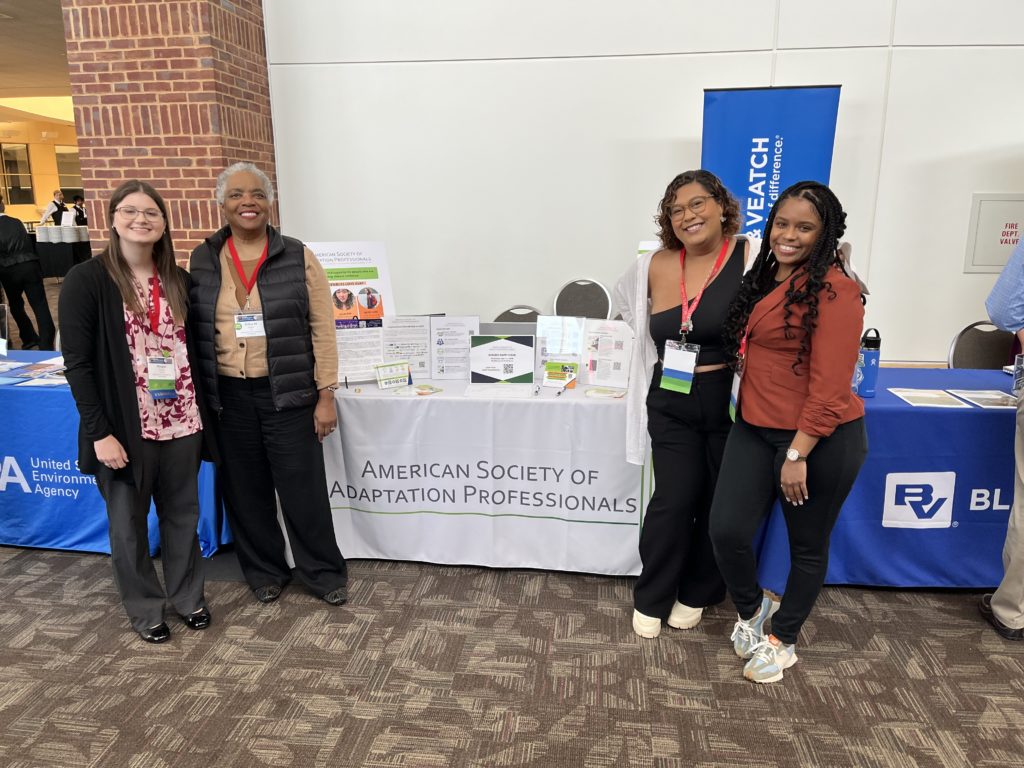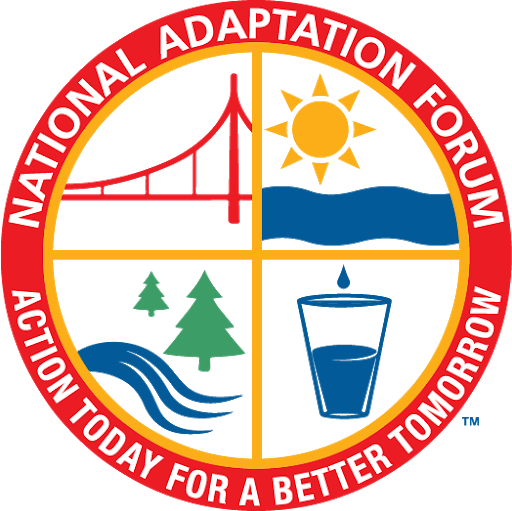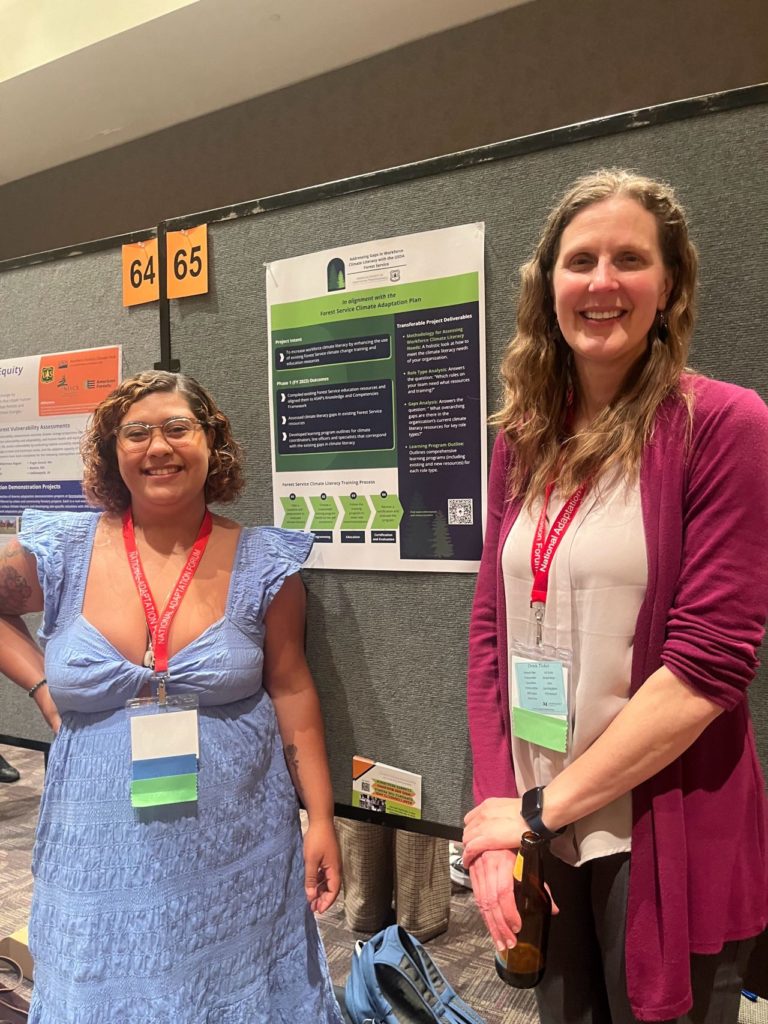2024 National Adaptation Forum Recap
The 6th National Adaptation Forum, held from May 14-16, 2024, at the RiverCentre in Saint Paul, Minnesota, sought to move beyond adaptation awareness and foster concrete adaptation action. This annual event emphasized the extensive range of adaptation initiatives underway within the United States and worldwide. With over 1,100 attendees, including more than 220 members of the American Society of Adaptation Professionals (“ASAP”), the forum showcased a robust representation of experts and stakeholders dedicated to advancing climate resilience.
The forum’s program featured specially organized sessions curated by ASAP Members, reflecting the collaborative spirit and interdisciplinary approach vital to effective climate adaptation. These sessions provided a platform for sharing cutting-edge research, innovative practices, and policy advancements, thereby facilitating knowledge exchange and capacity building among practitioners, policymakers, and researchers. The National Adaptation Forum reinforced its commitment to driving forward tangible adaptation efforts that address the multifaceted challenges posed by climate change.
ASAP Members who served as speakers, moderators, and special organizers have contributed their notes, session presentation materials, and feedback on sessions for the American Society of Adaptation Professionals Network.
Read on for a full recap of NAF sessions by day, or navigate recaps by session and date below:
- Climate, Trauma, and Healing Special Session
- Poster Session: ASAP and USDA Forest Service Partner to Address Gaps in Workforce Climate Literacy
- Climate Resilience for an Aging Nation Session
- Community-Led Adaptation Innovations and Policy Recommendations Special Session
- Beacons of Hope and Justice: Trends and Examples of Transformative Adaptation
- Planning, Implementing, and Evaluating Successful Adaptation and Resilience Projects Special Session
Conference Feedback from Members
Tuesday, May 14, 2024
Session: Climate, Trauma, and Healing Special Session
Session Description: With the frequency and intensity of climate extremes increasing the devastating costs on ecological and human communities, psychological trauma is also bound to increase. As is so often the case, these physical and psychospiritual impacts from disasters and climate-related losses affect the most vulnerable first and worst, leaving them with diminishing resources to recover – economically and emotionally. Additionally, these events typically intersect with systemic racism, forced displacement, colonial oppression, and generational poverty – forms of chronic trauma – which make climate-related trauma just one more in the long history of dehumanizing disregard for marginalized and underserved communities. In this session, we will hear different responses to this growing challenge: approaches to providing safe spaces for dialogue and healing as well as skill-building to address the psycho-spiritual impacts of climate disruption. Session attendees will experience a mix of brief panel contributions from four panelists, each offering a particular perspective and approach to dealing with climate, trauma, and healing. The panel will be followed by facilitated interactive discussions in smaller groups to explore these approaches more deeply. The session will conclude with a whole-group conversation about the implications for adaptation professionals.
Speakers
- Jessica Brunacini, University of Maine, Coastal Resilience Specialist
- ASAP Member and Past ASAP Board Member Susanne Moser, Susanne Moser Research & Consulting; Antioch University New England, Director; Research Faculty
Session Organizer
- Marcella Bondie Keenan
- ASAP Member Nicole Policicchio
Feedback:
“The session was very well attended (~80 people) and generated lots of hallway conversation about the importance of acknowledging climate-related losses and trauma, and the need to create spaces for grieving and healing. We opened the session with a case study of a community-facing retreat, and the use of photovoice to open up private conversations about loss and grief. It allowed people to process the changes happening and still coming and thus (hopefully) not getting traumatized. The session also included some basic education about loss, grief, anxiety, and trauma, and then offered people an opportunity to share their own stories of loss and grief.”
-ASAP Member Susanne Moser, Special Organizer
Poster Session: ASAP and USDA Forest Service Partner to Address Gaps in Workforce Climate Literacy
Session Description: The American Society of Adaptation Professionals (ASAP) has partnered with USDA Forest Service to create a structured education and training program for Forest Service staff, update ASAP’s Knowledge and Competencies Framework, and make a model for improving climate literacy that can be applied in multiple federal agencies and beyond. From this work, Maria Dozier, ASAP’s Training Specialist, will present a poster alongside Kristen Schmitt (USDA Forest Service Office of Sustainability and Climate) at the National Adaptation Forum in Minneapolis, Minnesota.
For almost 2 years now, ASAP and the Forest Service have been working side-by-side to guide progress on multiple project deliverables. At the poster session, you can expect to be informed on our:
- Methodology for Addressing Climate Literacy Needs
- Role Type analysis
- Gaps analysis
- Resource map
- Learning program outline
Feedback:
“Reporting from the closing of the 2024 National Adaptation Forum in Saint Paul, Minnesota! I am so happy to have presented a poster on addressing gaps in workforce climate literacy and education— a collaboration between American Society of Adaptation Professionals and USDA Forest Service. A big thanks to Kristen Schmitt, Rachel I. Jacobson, Lily Swanbrow Becker, Shelley Crausbay, Brooke Hagarty, and all other contributors. It also was so lovely to meet up with all of the University of Michigan- School for Environment and Sustainability alumni at the conference! Thank you so much to EcoAdapt for organizing! All of the sessions were phenomenal, and I am excited to attend again next year.”
-ASAP’s Training Specialist, Maria Dozier
Please contact Maria Dozier at Mdozier@adaptpros.org for any questions about the project.
Session: Climate Resilience for an Aging Nation
Speaker, Danielle Arigoni, National Housing Trust, Managing Director for Policy and Solutions
Session Description: Older adults are disproportionately impacted by climate change, and yet are often overlooked in climate resilience planning efforts – a pattern we must reverse to account for our changing demographics. By 2040, one in five people in the U.S. will be over 65, and older adults will outnumber children for the first time. Action is needed now at the community scale to reduce risks and improve safety and well-being for people of all ages, particularly because of the disparate impact that climate change has on older adults. For 20-plus years, the majority of people who die in major events (Hurricanes Katrina, Sandy, Maria, and Ian; Paradise wildfire and PNW heat waves; winter storms in Buffalo, etc) are over 60 years of age. This session discusses findings from a new book, Climate Resilience for an Aging Nation, which argues that climate resilience must be centered on the needs of older adults to solve the systems-wide failures that expose them and other vulnerable populations to greater risk. This session will foster conversation on how climate change differently impacts older adults, and what must be done across diverse sectors to build community resilience for an aging nation.
Feedback:
“This feels like a watershed week. It was truly an honor to have the time and space with an engaged audience at #NAF24 to go in-depth about the need to center climate resilience and adaptation plans on the needs of older adults. These are the adaptation practitioners who are designing our resilience plans – and they walked away with new ideas about why older adults’ needs should be better included, and how. Thanks again to EcoAdapt and [the] American Society of Adaptation Professionals for the opportunity – and the great conference (1000+ people strong!).”
– Danielle Arigoni, National Housing Trust, Managing Director for Policy and Solutions
Session: Community-Led Adaptation Innovations and Policy Recommendations Special Session
Session Notes: ASAP’s Training Specialist Maria Dozier
Session Description: The American Society of Adaptation Professionals invites you to a special session focused on community-led adaptation innovations. This session includes two 45-minute panel presentations that aim to inspire and inform solutions from the local to national levels.
The first panel, “Achieving Climate Ambition at Corridor Scale – Uniting Cities, States, and Indigenous Nations,” will discuss how Mayors and the conservation industry have joined together to create the largest non-federal pipeline of natural infrastructure projects along the ten-state length of the Mississippi River Corridor to achieve resilience, mitigation, and climate ambition. Additionally, for the first time in U.S. history, Mayors and Indigenous Nations have entered into an agreement to bring cities and Tribal governments together along the Mississippi River in large-scale ecosystem restoration work. This panel will detail these partnerships and how the public and private sectors are working to adapt to the most critical food-producing river basin on Earth.
The second panel, “Stories from Frontline Alaska Native Villages and National Policy Recommendations,” will host Tribal leaders from three remote Alaska Native villages to share stories and recommendations for how to advance the equitable delivery of national climate adaptation resources and services for frontline communities. This panel is an opportunity to engage with communities facing relocation and managed retreat, and learn about an example whole-of-government implementation framework for Alaska that could be tested and expanded nationwide.
Speakers
- Michael LaRoque, White Earth Nation, Treasurer
- Sara Burns, Ducks Unlimited, Water Program Specialist
- Colin Wellenkamp, Mississippi River Cities and Towns Initiative, Executive Director
- Walter Nelson, Native Village of Napakiak, Managed Retreat Coordinator
- Christina Waska, Newtok Village Council, Relocation Coordinator
- Janet Erik, Chefornak traditional council
- Tristan Agnauraq Morgan, Alaska Native Tribal Health Consortium, Community Grant Writer
Session Organizer
- ASAP Member David Savarese, Jacobs, Program Delivery Manager
- ASAP Member Max Neale, Alaska Native Tribal Health Consortium, Program Manager, Center for Environmentally Threatened Communities
- ASAP Member Sylvia Chang, AECOM, Senior Climate Adaptation and Resilience Planner
- ASAP Member Nichole Kain, Antioch University New England, Doctoral Candidate
Wednesday, May 15, 2024
Session: Beacons of Hope and Justice: Trends and Examples of Transformative Adaptation
Session Description: At every NAF since 2017, attendees are invited to collectively help assess the state of US adaptation; to make sense together of changes that are unfolding in the field, and in so doing, to learn important lessons about how to make change happen. Traditionally, this involved a look at the purpose, the people, the practices, and the pillars of support (policy and funding) for adaptation.
The session will identify, highlight, and explore examples of where human systems are becoming truly equitable; where healing has occurred and justice is being restored; where ecosystems are reestablished and thriving despite change and strain; where economies are in service to wellbeing without sacrificing nature; where minds change, wounds and rifts are healed, and differences are being bridged and embraced as sources of strength.
Outcomes:
- A sense of continued evolution and positive progress in the US adaptation field (building on the 2017 Kresge-supported Rising to the Challenge, Together state of the field assessment)
- Concrete examples (“beacons of hope”) of transformative adaptation to counter frustration and despair about adaptation not advancing fast or well enough
- A set of lessons learned of key “ingredients” of how to move toward, support and navigate transformational adaptation
Session Organizer
ASAP Member and Past Board Member Joyce E Coffee, Climate Resilience Consulting, President
Speakers
- ASAP Member and Past ASAP Board Member Susanne Moser, Susanne Moser Research & Consulting; Antioch University New England, Director; Research Faculty
- ASAP Member and Past ASAP Board Member Jacqueline Patterson, Chisholm Legacy Project, Founder and Executive Director
- Suzanne Burnes, Partnership for Southern Equity, Director, Just Growth Portfolio
- Jalisa Mauldin, Faith in Place, Indiana Outreach Coordinator
- Brendolynb Jenkins Boseman, The Imani Group Inc, Executive Director
- Katherine Egland, Co-founder, Education, Economics, Environmental, Climate and Health Organization (EEECHO)
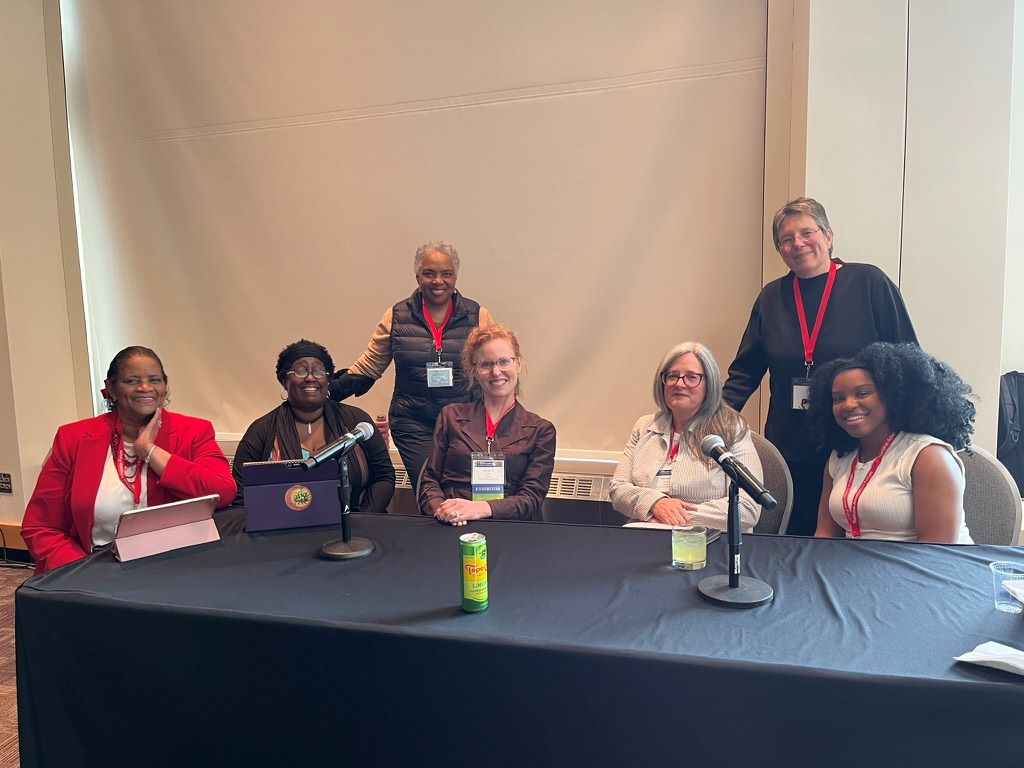
Feedback:
“The session was co-organized with Joyce Coffee and Jacqui Patterson, both ASAP Members. We have a session at every NAF to assess trends in the US adaptation field. This year, we asked similar questions as we have asked every year (see Menti polling results), but we mainly focused on hearing about and sharing stories of transformative adaptation. We invited a panel of speakers (moderated by Jacqui) and distilled lessons learned from them, then the audience shared their own stories of transformation.”
-ASAP Member Susi Moser, Speaker, Presenter
Thursday, May 16, 2024
Session: Planning, Implementing, and Evaluating Successful Adaptation and Resilience Projects Special Session
Session Description: Regardless of where we are in the adaptation and resilience planning process, how do we support successful adaptation projects that are effective and provide the intended benefits? How can we build in metrics, track progress, and assess how we’ve been successful?
Evaluation is a key component in every climate adaptation and resilience project but can be challenging to build into a project’s lifecycle. This session creates an intentional space for discussing strategies and challenges in incorporating evaluation into adaptation and resilience planning and implementation. A mix of presentations and training will explore best practices and case studies for evaluation within vulnerability assessments, prioritizing risks and selecting indicators to measure progress, identifying equitable adaptation alternatives, as well as selecting and evaluating strategies and measuring outcomes.
Speakers
- ASAP Member AnnaClaire Marley, ERG Inc., Climate Resilience and Data Specialist
- ASAP Member Tess Sprague, Brown, and Caldwell, Water Resources Climate & Resilience Lead, Planning and Policy
- Lindsay Willson, CDM Smith, Environmental Scientist
- ASAP Member Maite Duquela, Independent Consultant, Climate Resilience Research & Projects
Session Organizer
- ASAP Member Alec Appelbaum, AllBeforeUs, LLC, Storyteller
- ASAP Member Matthew Lettrich, ECS in support of NOAA Fisheries, Team Lead
- ASAP Member Rachel Johnson, Herrera Environmental Consultants, Water Resources Engineer
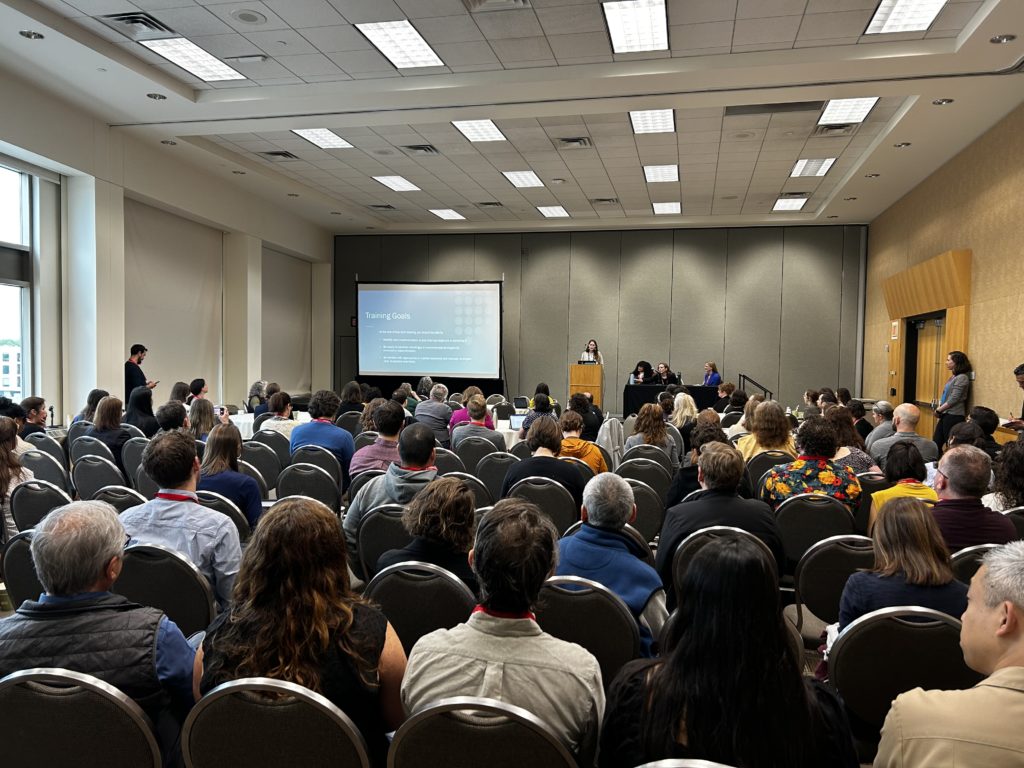
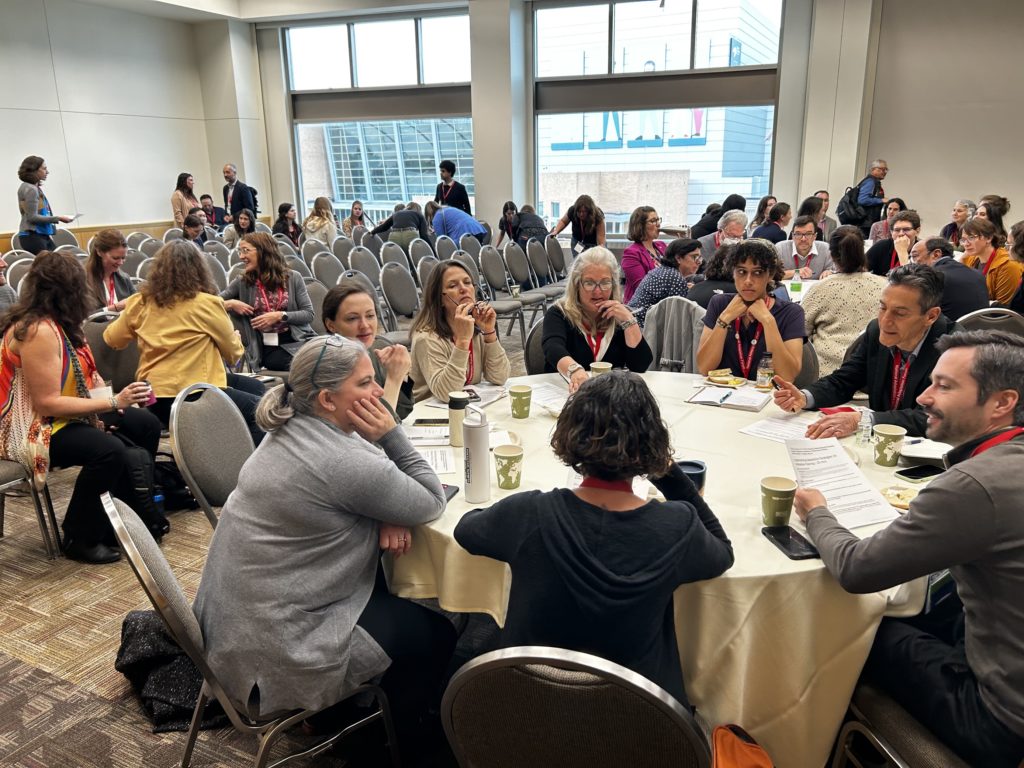
Member Feedback: Alec Appelbaum, Special Organizer
“Participants agreed that evaluation metrics should keep evolving with a project, reflect stakeholders’ experiences, and include some qualitative metrics.“
Member Feedback: Maite Duquela
“The National Adaptation Forum #NAF2024 was an incredible experience! I got to present my research on operationalizing the concept of climate resilience into a holistic and realistic framework. Moreover, I got to hear and talk to practitioners and experts afterwards on how much it resonated with their work, how useful it was, and how it validated or -in some cases- shifted their perspective!
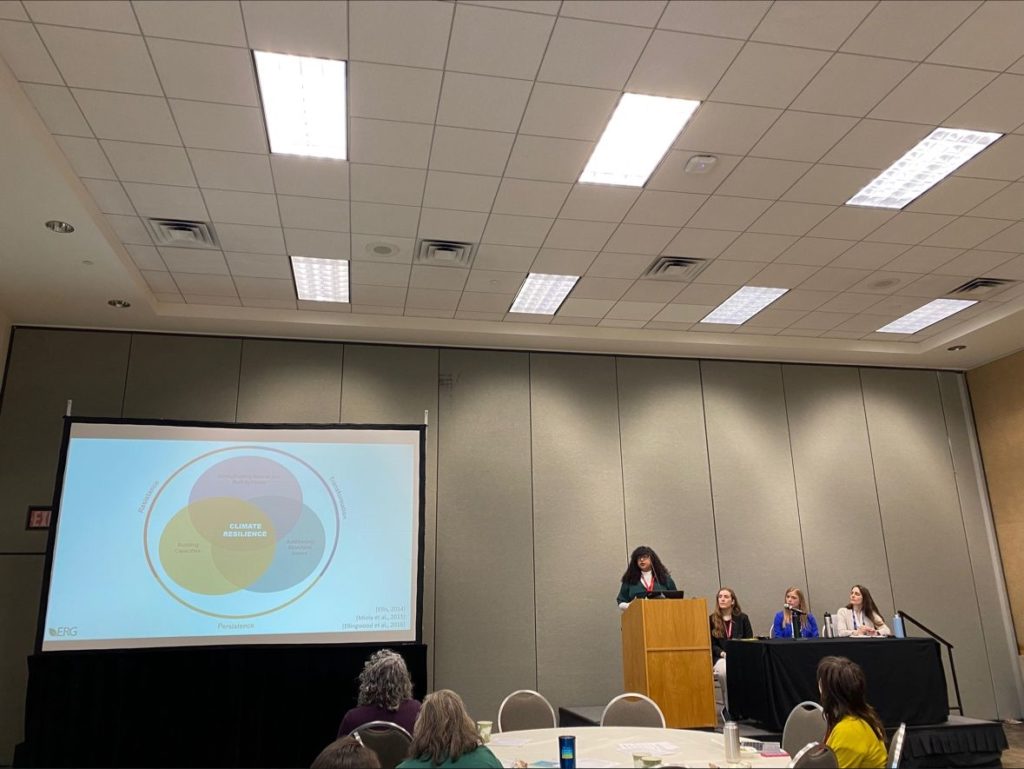
I also got to meet amazing people in this space and got to hear about some of the exciting work being done to advance climate adaptation and resilience efforts!
Thanks to ERG for supporting this research, and to American Society of Adaptation Professionals, Alec Appelbaum, Matt Lettrich, and Rachel Johnson for organizing a wonderful panel session!”
-ASAP Member, Maite Duquela
Conference Feedback
ASAP Member Yilin Giltinan, Resilience Planner at Jacobs
“That is a wrap for #NAF24, an exhilarating two-and-a-half day of inspiring discussions, groundbreaking ideas, and amazing connections. I gained valuable insights into the latest trends, emerging ideas, and perspectives, particularly on the issue of #ExtremeHeat.
It was great reconnecting with American Society of Adaptation Professionals members, my fellow adapter within Jacobs, and a fantastic Community Adaptation Learning Exchange teammate with whom I have worked with remotely for the past two years.
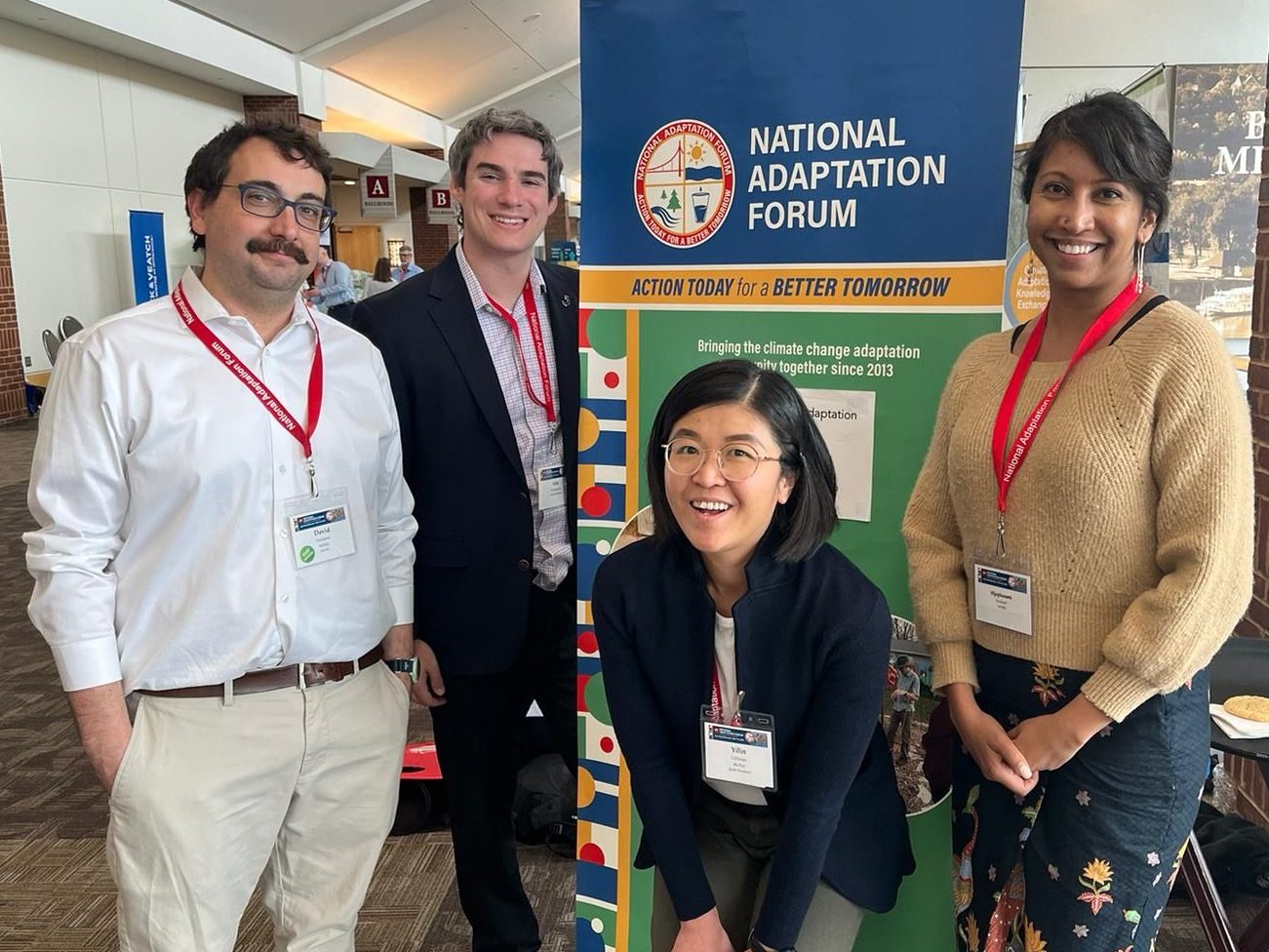
I’m ready to turn this energy into meaningful projects for #resilience infrastructure and community. I can’t wait for the 7th National Adaptation Forum!”
ASAP Member Aruni Ranaweera, Graduate Research Assistant to Former U.S. Secretary of Transportation Anthony Foxx at Harvard University
“Just returned from the National Adaptation Forum in St. Paul, Minnesota! What excites me about adaptation is the interdisciplinary nature of conversations between policymakers, planners, advocates, engineers, and scientists. It was inspiring to hear about innovative adaptation and resilience initiatives from across the country. Here are some of my main takeaways:
– 🏡 Displacement and relocation due to climate change will require government-supported land buy-outs and relocation assistance. As Lanor Curole from United Houma Nation Inc shared, it will be critical for policymakers to work with representative neighborhood and tribal coalitions to ensure communities receive truly just compensation that reflects the economic and cultural value of their homes and neighborhoods.
– 📊 Accurate climate modeling will be critical to decision-making in uncertainty to determine appropriate adaptations. It was exciting to get a preview of some of these models such as FEMA’s new Future of Flood Risk Data (FFRD) initiative that is working to create transparent, composite risk assessments for flooding.
– 🔌 Adaptation can be integrated into a range of policy interventions, including mitigation efforts. As Joel Scheraga from US Environmental Protection Agency (EPA) described, policymakers should view adaptation as tool of continuity — you want to ensure your investments, upgrades, and innovations are resilient to ongoing climate change.
– 🎙️Communicating the cultural and economic impacts that climate change can have on individuals’ lives, jobs, and communities helps expand support for adaptation beyond a climate audience. I appreciated Armando Moritz-Chapelliquen presenting Local Initiatives Support Corporation (LISC)’s program on business continuity planning as a tangible adaptation action that resonates with small business owners.
– 💵 To make a stronger case for adaptation, it’s critical to both describe and measure the broad co-benefits and systemwide benefits that resilience can bring such as increased access to green space, increased public transit usership, or avoided storm damage costs. As Sarah Hammitt Colasurdo for The Port Authority of New York & New Jersey described, quantifying the full system benefits can keep resilience from being “value-engineered out” or cut from city capital planning budgets.
It was so exciting to meet fellow adaptationers (American Society of Adaptation Professionals), including many who have inspired my career! Thank you to the Barr Foundation for the generous support in making it possible for me to attend!”
ASAP Member Logan Gerber-Chavez, Assistant Professor of Disaster Science at Embry-Riddle Aeronautical University
“I’m so honored to have had the opportunity to present some ongoing floodplain buyouts research at the National Adaptation Forum in St. Paul, MN last week. This was my second time at the National Adaptation Forum and every time I am so amazed by the inspirational messages and inclusive environment for such a wide variety of people in the climate adaptation space.

Special thanks to American Society of Adaptation Professionals and the amazing Kelly Leilani Main, Vidya Balasubramanyam, and Elizaveta Barrett Ristroph, Ph.D., J.D. for organizing such a great session on Climate Displacement, Managed Retreat, and Relocation. We had amazing conversations and learned so much, hopefully we can keep working on these very important topics together.”
Thank you to everyone who contributed their materials to the network.
